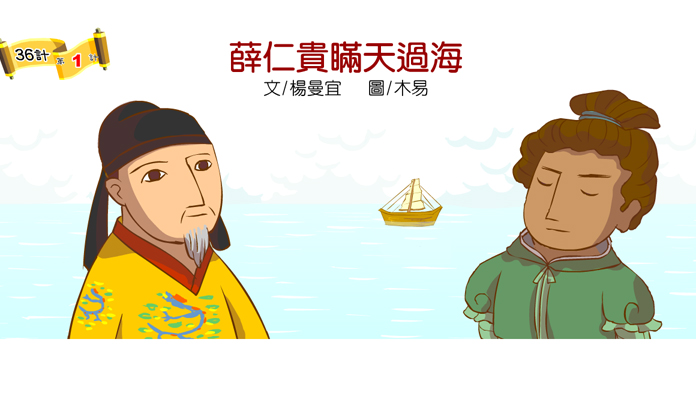唐太宗貞觀十七年,太宗親自出征,領軍三十萬東征。一天,來到大海邊,看到汪洋一片,便問一旁的官員過海的計策,大家這時只能互相對看。這時忽然聽到一位居住海上的豪民求見太宗,並說三十萬過海的軍糧及方法已經準備好了。太宗便率領百官隨這位豪民來到海邊,這時只看到萬戶都用彩帳遮著,好不嚴密。這位豪民領著太宗進到屋內,屋內四周都是繡幔彩錦,太宗就和百官在這裡飲酒作樂。不久,風聲四起,波響像雷一樣,杯盤跌落滿地,人也跟著搖晃,這時太宗立刻叫近臣揭開彩帳,一掀開,大家都呆住了,哪裡是在豪民家作客,已經和三十萬大軍在海上了!原來,薛仁貴怕皇上不敢過海而退兵,所以就假扮豪民策劃了這個「瞞天過海」的計策。
三十六計之第一計: 瞞天過海
皇帝向來稱為「天子」,所以「天」指的就是皇帝,「瞞天過海」原意是瞞著皇帝,讓他平穩渡海。在兵法上是使用偽裝的手段,利用機會,趁對方不注意的時候,出其不意的行動,讓人措手不及。
On year 17 of Tang Tai Zong Jhen-guan's reign, the emperor personally led his army in a military campaign out east to conquer and expand his domain. One day, the army arrived at a seashore. Looking at the vast waters beyond, he asked his generals for any ideas on how to cross the sea. They looked at each other for any suggestions but had none.
Suddenly, a civilian who lived by the sea requested to see the emperor. He informed the emperor that all the food for the three hundred thousand troops and the means to transport such a vast army across the sea have been prepared. The man led Emperor Tang Tai Zong and his officials to the sea. There, by the shore, they saw thousands of households tightly packed together and covered with colored tents.
This man led Tang Tai Zong into a luxurious house. Around the walls there were embroidered curtains and colored silks. There Tang Tai Zong and his officials drank , relaxed, and had fun.
Soon afterwards, the wind started to howl, and the sound of the waves felt like thunder. Glasses and plates fell all over the place, and no one could stand still. Startled, Tang Tai Zong ordered his chamberlains to draw back the curtains immediately, and they were stunned by what they saw. They were not partying at a civilian's house like they thought. Instead, they were already at sea together with a giant armada of boats carrying the three hundred thousands soldiers. Later the emperor found out that his general Syue Ren Guei had thought up this deception. He was afraid that the emperor did not have the guts to cross the sea and would have withdrawn the troops and cancelled the military campaign. So he disguised himself as a civilian and devised such a scheme to "Fool the heaven (the emperor) to cross the sea".
Strategy 1 : Fool the Emperor to Cross the Sea
In ancient china, the emperor was considered "The Son of Heaven". And heaven is often used in literature to refer to the emperor. Therefore, the saying "fool the heaven to cross the sea" means to fool the emperor to cross the sea.
In military parlance, "fool the heaven to cross the sea" means using disguise to create opportunities and striking suddenly when the enemy is unaware.


